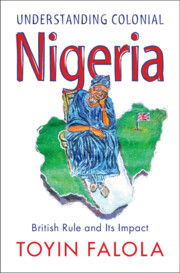Book contents
- Understanding Colonial Nigeria
- Understanding Colonial Nigeria
- Copyright page
- Dedication
- Contents
- Figures
- Maps
- Preface
- Acknowledgments
- Timeline of Events
- Part I Introduction
- 1 The Colonial Archives and Alternative Voices
- 2 Narrating Colonial Nigeria
- Part II Conquest and Colonization
- Part III Colonial Societies
- Part IV Nationalism and Independence
- Part V Conclusion
- Bibliography
- Index
1 - The Colonial Archives and Alternative Voices
from Part I - Introduction
Published online by Cambridge University Press: 21 November 2024
- Understanding Colonial Nigeria
- Understanding Colonial Nigeria
- Copyright page
- Dedication
- Contents
- Figures
- Maps
- Preface
- Acknowledgments
- Timeline of Events
- Part I Introduction
- 1 The Colonial Archives and Alternative Voices
- 2 Narrating Colonial Nigeria
- Part II Conquest and Colonization
- Part III Colonial Societies
- Part IV Nationalism and Independence
- Part V Conclusion
- Bibliography
- Index
Summary
This chapter discusses the subject of archives: what they are, how they are uniquely constructed and preserved, their importance for creating historiographies and scholarly traditions, how they are subject to human error, the consequences of said error, and alternative sources of historical records. These topics are explored primarily through the case study of Nigeria’s Colonial and National Archives. The chapter will explain how the Colonial Archives were used as tools to extend colonial power while also springboarding African historiography through consequential and highly problematic methods. Next, it will explore the transformation of the Colonial Archives into Nigeria’s National Archives, pioneered by Kenneth Dike at the University of Ibadan. This transformation fostered significant changes in Nigeria’s historiography, the details of which will be examined. The chapter will also address the many issues present within Nigeria’s National Archive. Finally, it will explore the alternative voices to the domineering Eurocentric frameworks in “modern” (colonial) African historiography. They include but are not limited to written documents from Northern Nigeria, such as the Kano chronicles, oral traditions from the Yoruba and Igbo peoples from Nigeria’s south and east, rituals, customs, festivals, and much more.
Keywords
- Type
- Chapter
- Information
- Understanding Colonial NigeriaBritish Rule and Its Impact, pp. 3 - 24Publisher: Cambridge University PressPrint publication year: 2024

